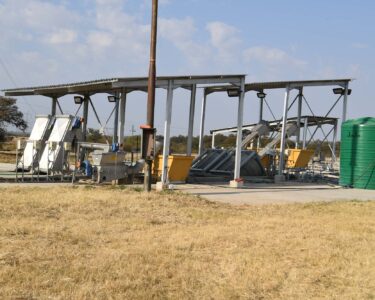For years, macadamia farming in Zimbabwe has been known to be the preserve of Manicaland Province, especially in areas around Chipinge Town. A number of corporate giants like Tanganda Tea Company, a name synonymous for with tea production; and Parrogate have since joined the fray, jolting into life the sleepy town. Seeing that the people of Manicaland were “minting gold” from macadamia nuts, farmers in Mashonaland Central and Mashonaland East have also joined the bandwagon.
While there is a marked increase in the number of farmers venturing into macadamia production, our reporter, Elias Chakanyuka, recently discovered that the industry is not exactly booming. For one, prices on the international market are tumbling while demand from traditional markets like China is on the decline. Chakanyuka unpacks the reasons why the smiles are slowly disappearing from the macadamia farmers’ faces.
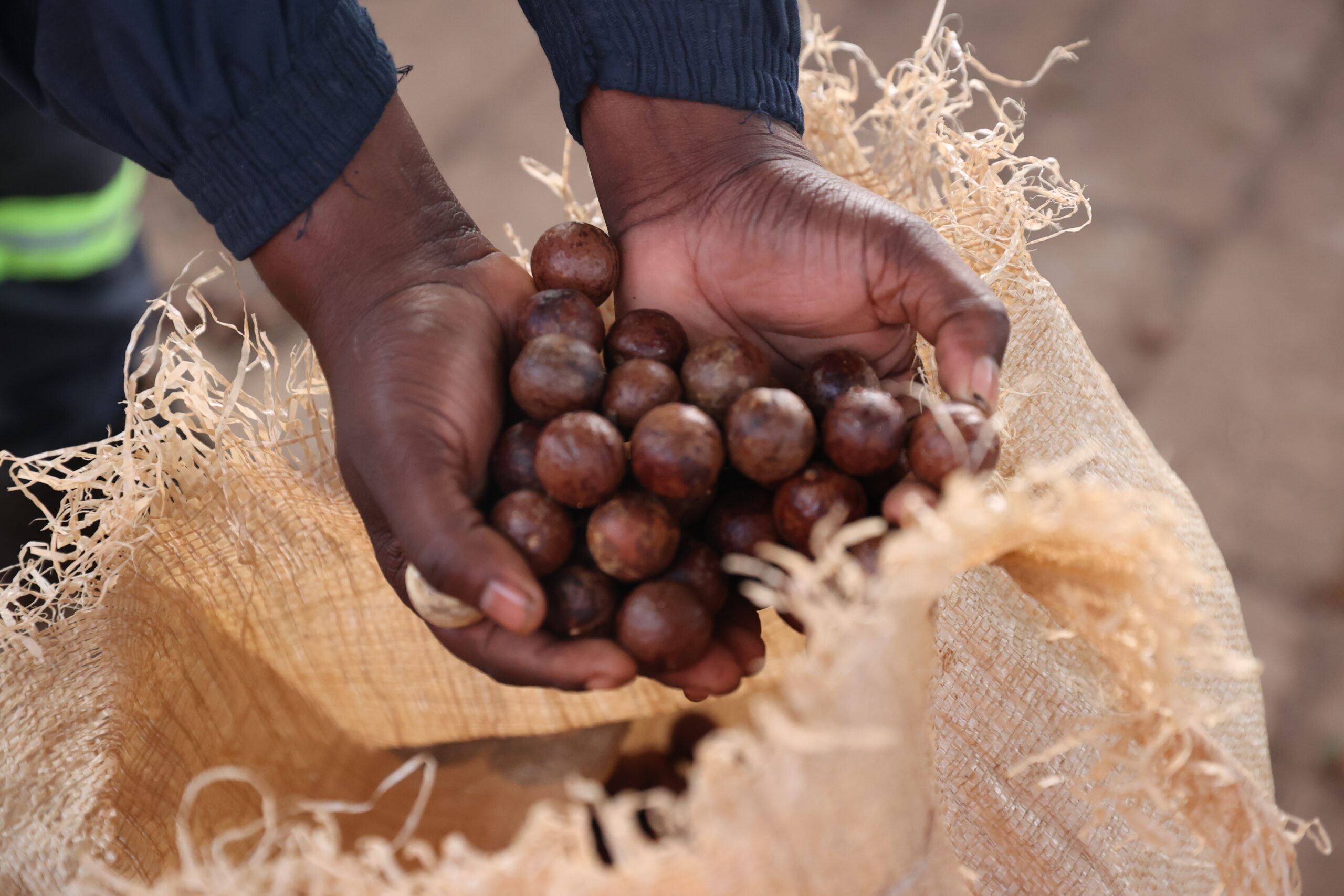
nuts, however there is need for value addition and beneficiation
The district development coordinator for Chipinge, William Mashava, is a happy man. Over the past few years he has witnessed the slow awakening of Chipinge Town as more and more companies venture into macadamia production.
‘Chipinge is a sleeping giant’
“I think Chipinge is a sleeping giant, and the giant is slowly awakening from its slumber. Under the New Dispensation, positive things are happening in Chipinge. I have no doubt that this district will soon be the talk of Zimbabwe. Many companies are flocking to Chipinge to go into macadamia farming. Big companies like Tanganda Tea Company, which are traditionally known for tea production, are also venturing into macadamia farming.
“On the other hand, we have companies like Parrogate that have invested millions into macadamia production. These are exciting times, indeed, for Chipinge. But there is a downside. The demand for the nuts is going down and farmers are feeling the pinch. The market is no longer as lucrative as it was before. What we need is more value addition to expand the market.

Chipinge is a sleeping giant, and the giant is slowly awakening from its slumber.
Under the New Dispensation, positive things are happening in Chipinge”
“At the moment, most of the companies are simply drying the macadamia nuts and selling them to South Africa and China. This means the middleman is getting a fortune at the expense of the local farmers. There is need for more research to see how we can add value to the macadamia nuts by manufacturing an assortment of products like soap, cooking oil, etc.
“We have spoken to a number of companies in a bid to encourage them to go into value addition. The response, so far, has been gratifying, with a new farmer, Shandirayi Mahemu, setting up a macadamia nuts processing factory. Mahemu is one of the very few farmers who is going to dry and crack the nuts, which most of the companies in Chipinge are currently not doing.
“However, we have small-scale farmers who are already cracking the nuts and selling spiced macadamia nuts. While this is a step in the right direction, we would like to see the big companies engaging in value addition on a large scale. I realise this won’t happen overnight, but I am confident these companies will soon invest in the machinery required to process the macadamia nuts.
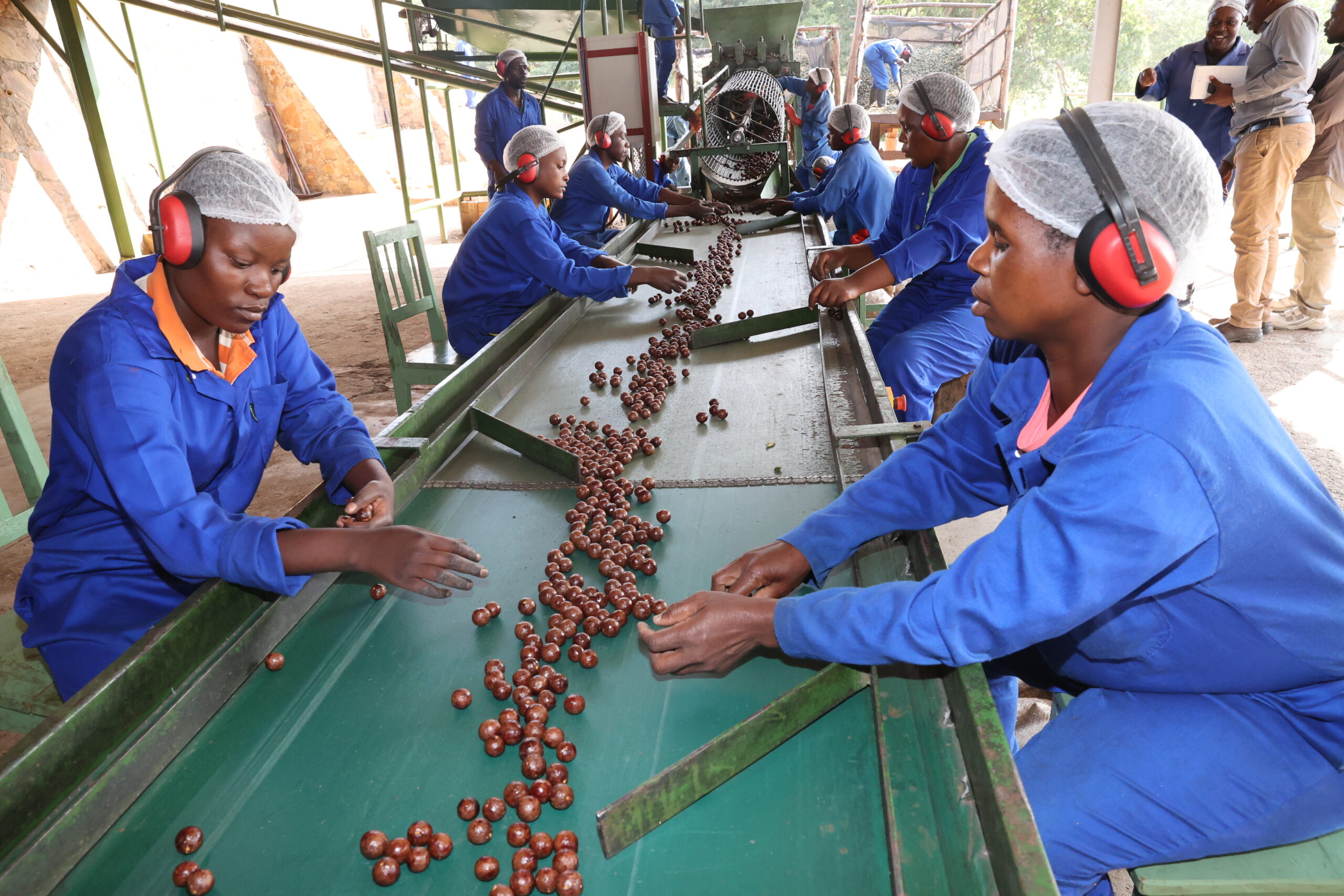
macadamia sorting plants in Chipinge
“The macadamia nut fever is catching on as evidenced by the growing number of farmers from outside Manicaland, who are coming to buy macadamia plants to grow in their areas. We don’t have a problem with that. We believe that the more the merrier. The real challenge is on value addition,” added Mashava.
How Chipinge became the epicentre of macadamia farming
In a paper titled An insight into the macadamia nuts industry of Zimbabwe. Its history, current state and constraints, published in the International Journal of Research and Innovation in Social Sciences, Volume VI, Issue II, February 2022, researchers Innocent Mharidzo, John Mwandifura, Lovemore Chikazhe, Manyeruke and Mashavakure unpack the history of the macadamia industry in Zimbabwe.
The abstract to the article reads: “The search engine results revealed that Zimbabwe’s macadamia nuts history dates back to 1965 when 3 farmers imported seedling material from Australia for planting and selling. A PECMAC factory transferred to Southdown Estates was processing the macadamia nuts producing oil, cracked nuts, butter and residues for marketing.
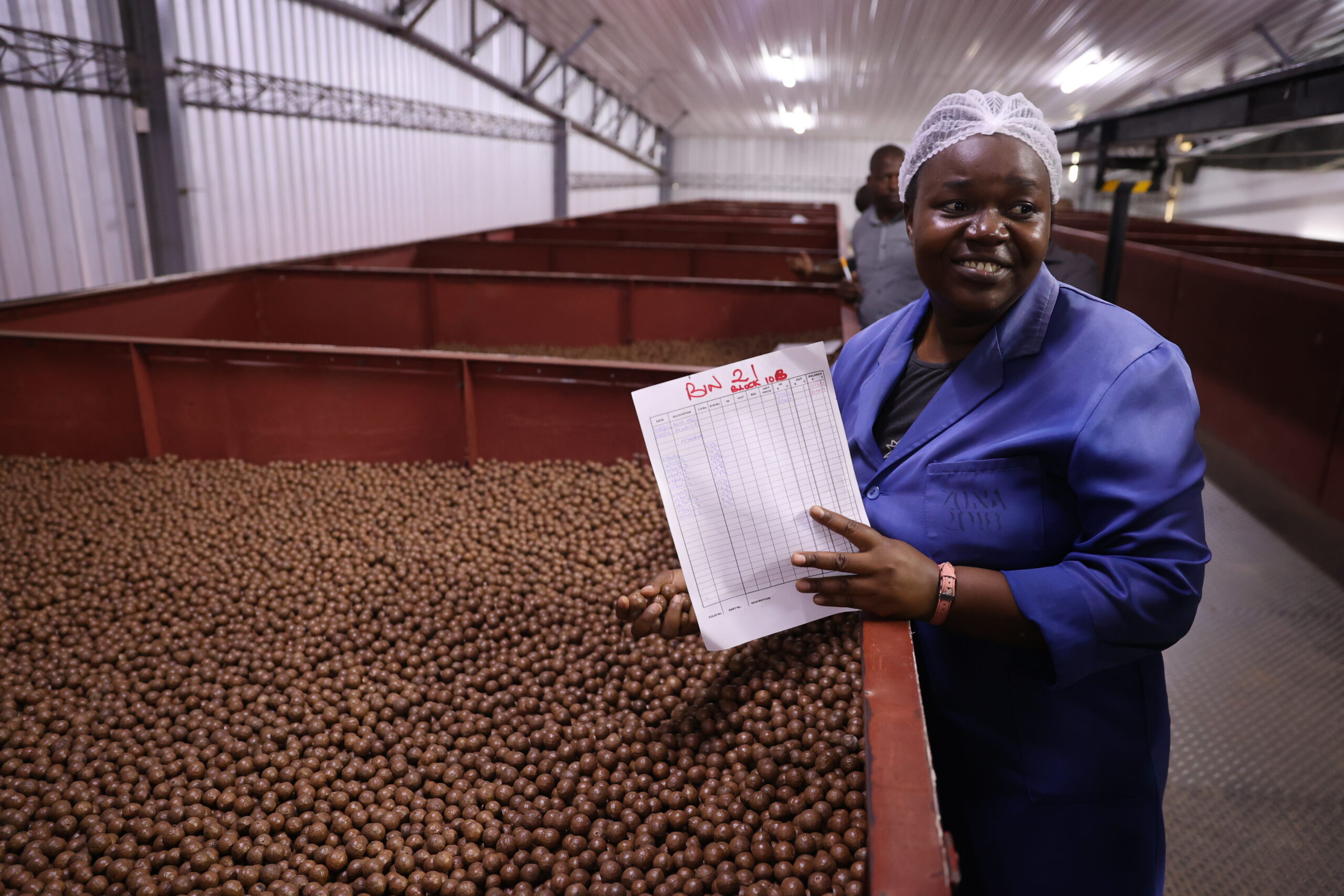
Tanganda Tea Company, Nyasha Dhliwayo, shows
some of the macadamia nuts before they are crushed
“When the government of Zimbabwe embarked on the land reform programme this marked the entrance of A1 and A2 farmers into macadamia nuts farming which was by then only common in Chipinge District. Establishment of macadamias has now spread to other districts of Manicaland province among them Chimanimani, Mutasa, Nyanga and Mutare and to other provinces like Mashonaland East and Mashonaland Central.
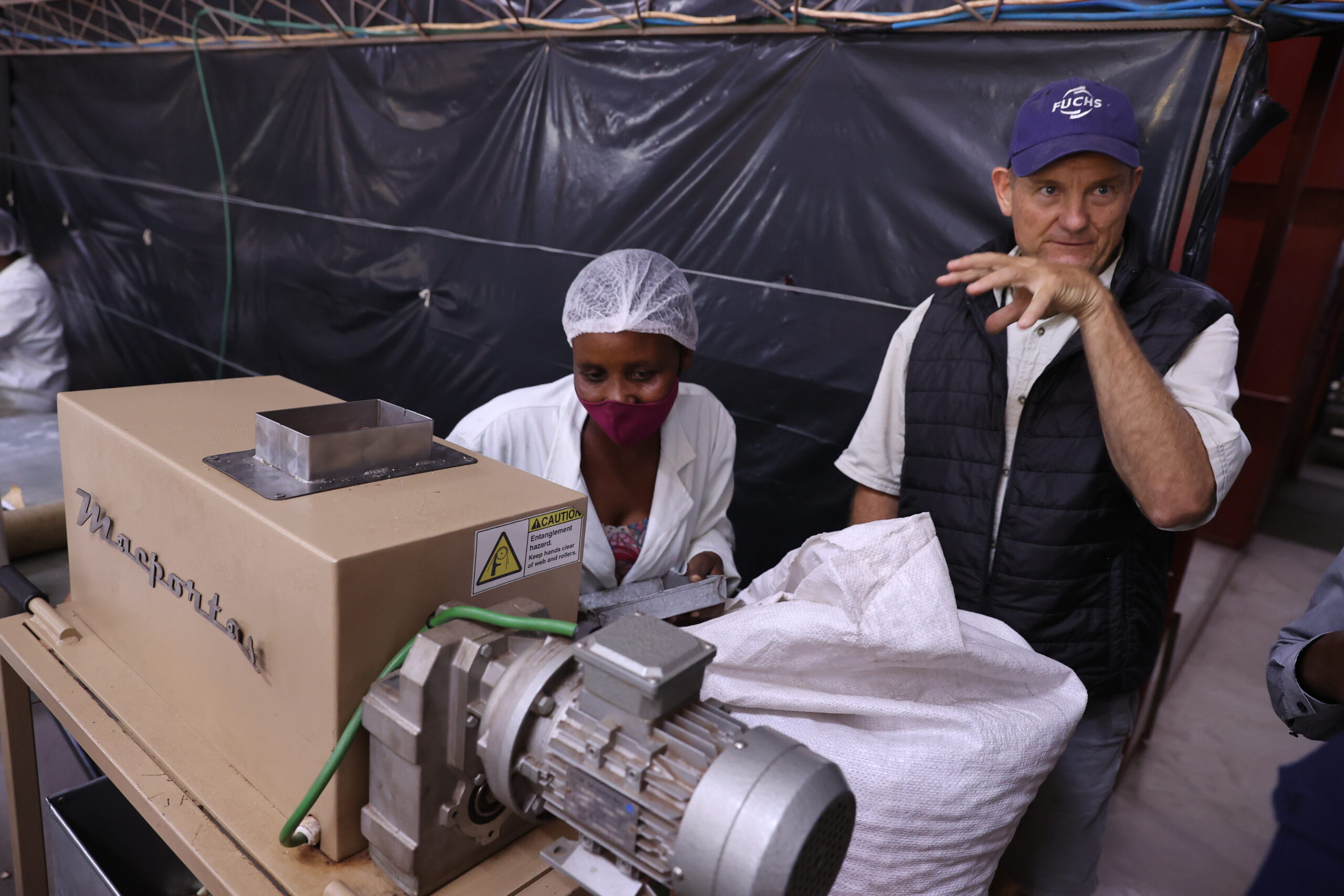
Tanganda Tea, Tony Saywood (right) says the company is planning to
venture into value addition and beneficiation at a large scale
“Although the country’s National Export Strategy is basing on macadamia nuts to meet Vision 2030, the government does not support the industry, which up to now has no research institute and is experiencing high cost of inputs. Currently, macadamia nuts farmers mostly get support from buyers through contracts, which later put them at a disadvantage when the contractors buy their nuts at very low prices. Policy regulations to support the industry are still not convincing with only Statutory Instrument 38 of 2019 the only one in place.
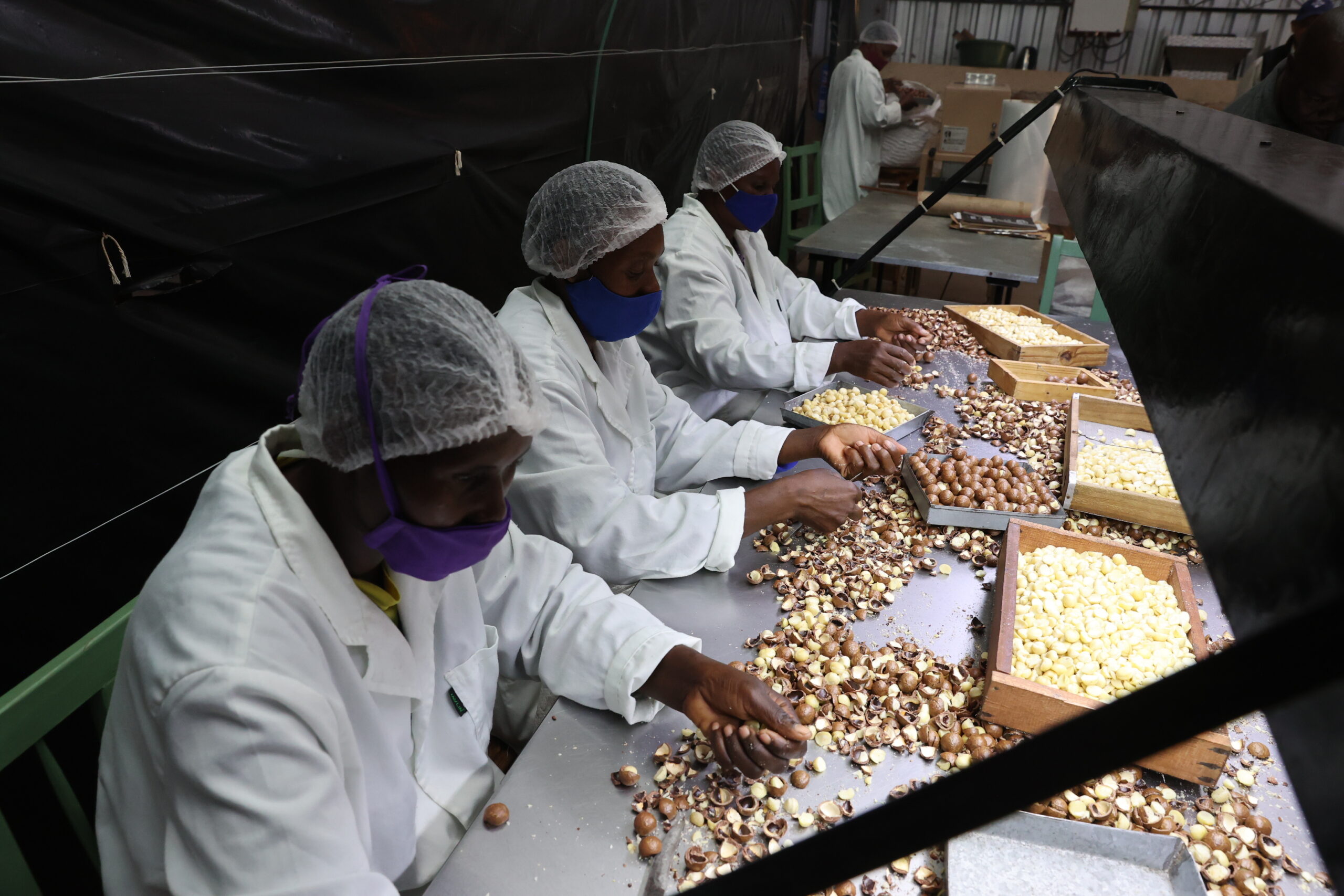
“However, the Statutory Instrument does not promote growth of the industry through agitating for value addition. The country is currently exporting nuts in shell and in the process losing millions of dollars. Zimbabwe exports its macadamia nuts to Asia and South Africa with the European market still closed because of land reform disputes.”
Macadamia nuts industry in Zimbabwe
According to Mharidzo, et al, in Zimbabwe 95% of macadamias are grown under dryland farming, leaving only 5% under irrigation. The researchers said according to the Agricultural Marketing Authority (AMA) varieties mostly grown in Zimbabwe are Beaumont and Intergrifolia.
“The macadamias are very common in Chipinge District where ideal climatic conditions for the orchards are in place. Farmers from other districts like Chimanimani, Nyanga and Honde Valley have also joined macadamia nuts farming due to their good returns. Establishment of the macadamia nuts has now spread to other provinces like Mashonaland East and Mashonaland Central with 961 farmers registered to grow macadamia nuts countrywide by 2019 (AMA: 2021).
“In Mashonaland East, Marondera University of Agricultural Sciences and Technology (MUAST) got the mandate to chair the taskforce responsible for introducing macadamia nuts in the province. The taskforce consists of the Horticulture Research Institute (HRI), Kushinga Phikelela National Farmers’ Training College (KPNFTC), Kushinga Phikelela Polytechnic College, Ministry of Industry and Commerce, Agricultural Marketing Authority (AMA), Agritex (Agriculture Research and Technical Extension Services), Forestry Commission and the [National Liberation] War Veterans’ Association. The project got the green light after the Horticulture Research Council had carried out a feasibility study of the project, which yielded positive results. The province’s main target is to improve the livelihoods of people and use the orchards as an afforestation project.
“By 2018, the macadamia nuts orchards covered about 5,000 ha with mature trees producing an average of 3-4t/ha although the country has potential to produce around 8-12t per ha if best management practice is put on the orchard. (ZimTrade, 2018). Currently, the biggest producer of macadamia nuts in Zimbabwe is Ariston Holdings. Tanganda Tea Company, a firm that was specialising in tea, has now diversified into avocado and macadamia nuts.
“By 2020, the company had established 779 ha of macadamia nuts and the company’s top management believes the project could offer them with sustainability and welfare for their over 5,500 workers. Other commercial producers include Buzi Tea Company and Makandi. Wattle Company, which is into timber, is also eyeing macadamia nuts . . .
“According to ZimTrade (2018), the Zimbabwean macadamia nuts producers have gained adequate knowledge on macadamia production. However, they need to improve on working together and sharing information to continue producing high-quality nuts. Harvesting of Beaumont nuts in Zimbabwe starts in March with nuts falling on the ground or the tree is shaken to release the nuts, which are then handpicked,” wrote the researchers.
They lamented that macadamia nuts production and expansion in Zimbabwe faces many challenges, among them the high cost of seedlings, lack of irrigation infrastructure, poor storage facilities and lack of research on best varieties for the country.
On the marketing side, the researchers noted that small-scale macadamia farmers sell their macadamia nuts to intermediaries who do not give them value for money on their produce. The buyers include Dexing, a Chinese-owned company; Parrogate, an Indian-owned company; Cropate Agricultural Services and Premium Nut Company. The companies buy macadamia nuts at very low prices ranging from US$1.50- US$2/kg and export them to countries like China where they fetch better prices.
The researchers also bemoaned that macadamia nuts had the potential to earn foreign currency for the country, but this was not happening on a bigger scale due to lack of lucrative markets. They added that although Zimbabwe was rated No. 6 among exporters of macadamia nuts in the world in 2019 it still had the capacity to improve on its export earnings. However, they noted that Zimbabwean producers of macadamia were finding it difficult to break into the European market, leaving them to export their nuts to South Africa and China.
Tanganda Tea Company diversifies into macadamia production
The Brick by Brick magazine team recently visited Tanganda Tea Company’s US$3.5 million macadamia processing plant at New Year’s Gift Estate just outside Chipinge Town where they came face to face with some of the researchers’ observations. The team spoke, in turn, to the estate manager, Willis Gutu; the agricultural manager in charge of macadamia and coffee, Tony Saywood; the macadamia factory manager, Nyasha Dhliwayo; and the group human resources manager, Francis Chingono.
By way of breaking the ice, Saywood told Brick by Brick magazine: “Built by locals, this is one of the most modern macadamia processing plants. It cost about US$3.5 million. It’s one of the country’s most environmentally-friendly machines. This plant was designed in 2020 and commissioned in March 2021. We have an amazing group of artisans. We are in our third season now in terms of macadamia nut processing.
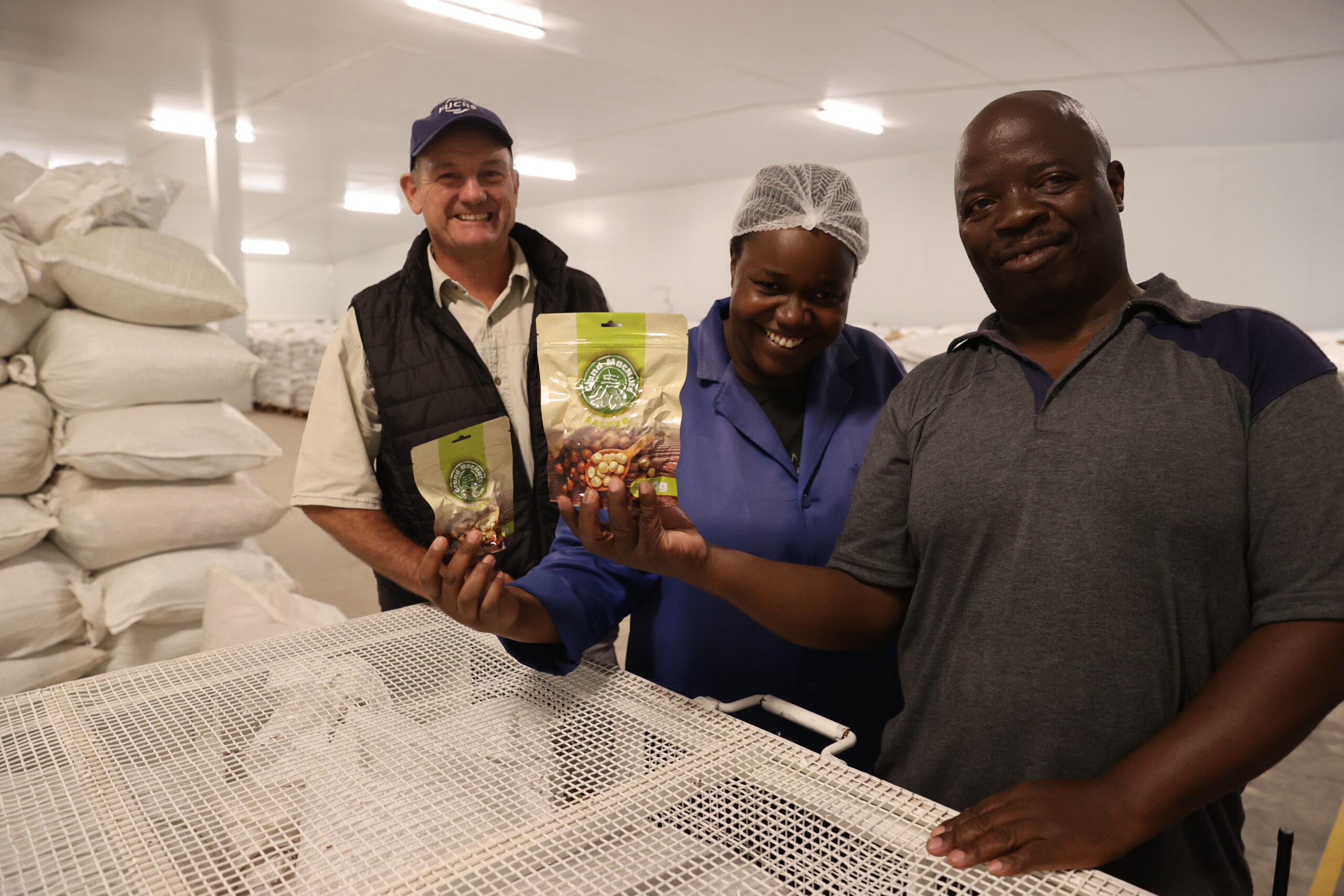
Company, Tony Saywood (left); the factory manager, Nyasha Dhliwayo (centre); and
the estate manager at New Year’s Gift Estate, Willis Gutu (right), show off some of the
company’s finished products
“Tanganda Tea Company has 5 estates altogether, with 3 of them growing macadamia nuts. We have about 900 ha under macadamia and 120 ha under coffee. We do all the processing and packaging of the macadamia here. We also do the value addition – roasting and grinding — of the macadamia nuts. We supply the nuts to global markets like China and South Africa and have plans to invest more into value addition and beneficiation.
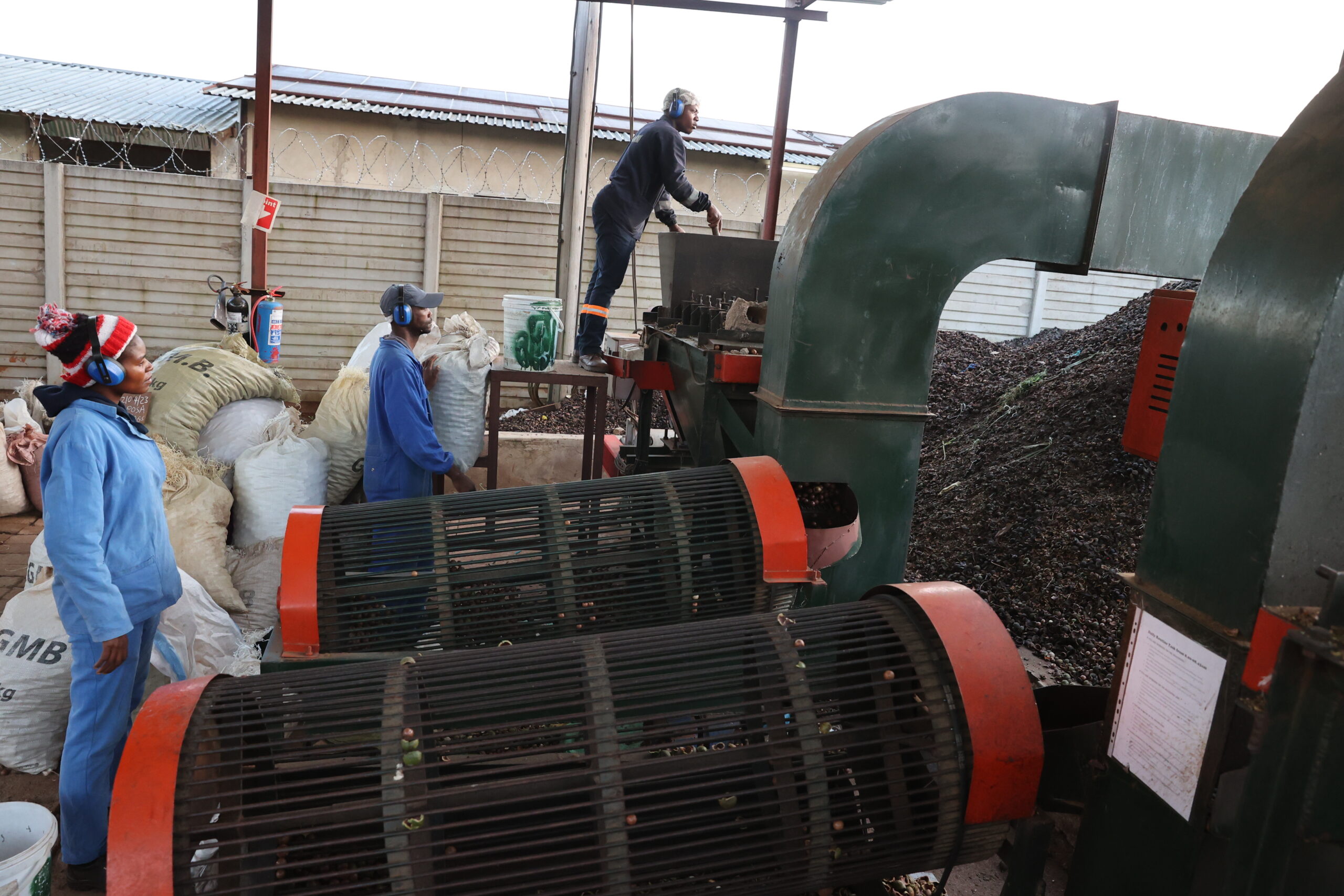
macadamia nuts into the processing plant
“The nut and shell market is a bit sluggish, that’s why we would like to venture into value addition. Right now, we are launching a new marketing strategy to value add and penetrate the global market,” explained Saywood.
During a tour of the plant, the factory manager, Nyasha Dhliwayo, told Brick by Brick that the factory had a 54-strong workforce. “Our workforce is drawn mostly from the surrounding communities and I am glad to report that the majority of them are women. The main task here is sorting, which means identifying unwanted macadamia nuts and discarding them. This is quite a delicate job and I believe when it comes to work that requires such detail and focus, women are the best.”
The human resources manager highlighted some of the challenges that the company was facing in recruiting casual labour. “As you will probably know, the picking of macadamia nuts requires a lot of labour, which is in short supply. The majority of our youths are not keen on the job. You go to Chipinge Town and you will see jobless youths loitering around. But they are not interested in coming to work for us. It’s the same with coffee.
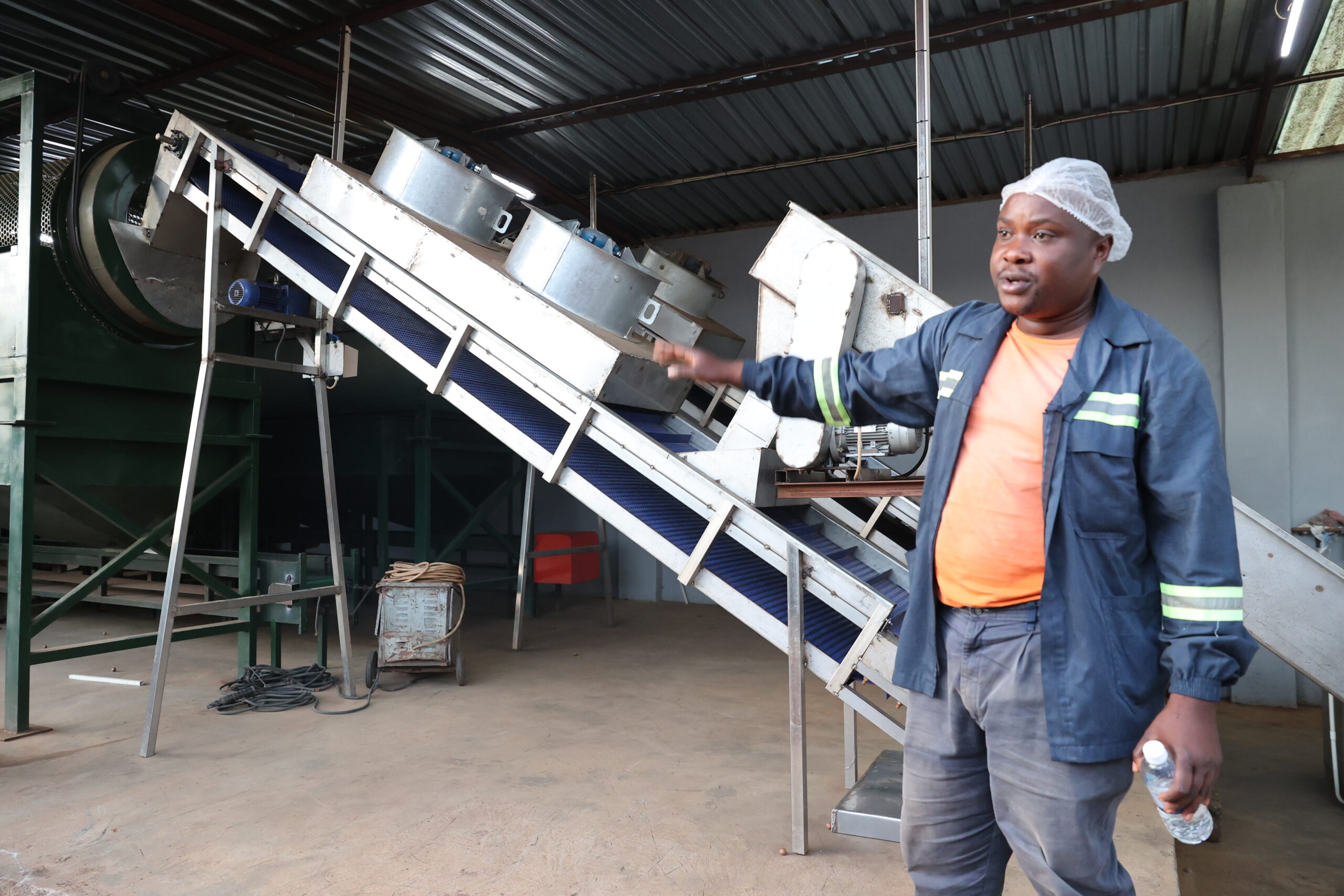
“We sometimes have to travel all the way to Chiweshe, Gokwe and Karoi to recruit casual labour to pick the macadamia nuts,” Chingono said.
The parting words came from the estate manager, Gutu. Lamenting the falling prices of macadamia nuts in South Africa and China, he noted that China was, in fact, now growing its own macadamia. This, he said, was the spark the company needed to venture into value addition and beneficiation. This is the only way to go. In 5 years’ time, we will be exporting only value-added products. We have already started rolling out the plans,” Gutu said.
Next stop was Parrogate, whose head agronomist, Ngonidzashe Dube, was on hand to give Brick by Brick a guided tour of the macadamia processing plant, which was commissioned in 2018.
Said Dube: “We buy macadamia nuts from surrounding farmers. We have contracted about 84 farmers – both A1 and A2, from Chimanimani, Vumba and Chipinge — to supply us with macadamia. We give them inputs like fertilisers, chemicals and advisory services so that they produce nuts of the highest quality.
“We have a team of scouts who take samples from the farms. We test the nuts for quality and once they reach maturity we dispatch our trucks to collect them. As soon as we take delivery of the nuts, we subject them to more rigorous quality checks. This is followed by a process called de-husking to remove the shell, after which sorting and grading are carried out.
“We export most of our raw macadamia nuts to South Africa, but demand is on the wane. I think one of our biggest challenges is that the macadamia industry is fragmented. There is need for us to join hands and come up with clearcut standards and marketing strategies as a group. After all, there is strength in numbers,” explained Dube.
Indeed, all is not well
In an interview with The Manica Post, the voice of Manicaland, the secretary of the Macadamia Nuts Producers’ Association of Zimbabwe, James Maisiri, was quoted as saying: “As local farmers, we are yet to penetrate the lucrative foreign markets. Our major market was China, but China is no longer lucrative as they are now producing their own nuts. This has greatly affected our prices.
“Cartels have emerged and are buying the nuts for a pittance from desperate farmers. Many farmers are struggling to buy chemicals and inputs since their prices are continuously going up . . . A ban should be imposed on the export of raw macadamia.”
It is estimated that Zimbabwe has over 12,000 ha under macadamia and produces between 8,000 and 10,000 tonnes per year.
In their research, Mharidzo, et al, gave an insight into why the macadamia industry in Zimbabwe is underperforming.
“It is evident that the macadamia industry in Zimbabwe is still at its infant stage when compared to other African countries like Kenya, Malawi and South Africa. The growth of the industry has been very slow given the fact that it started in 1965. This is attributed to lack of tangible support from the government. The country does not have a macadamia research institution and extension knowledge is limited. Seedlings are expensive with some farmers charging US$5 per seedling.
“Moreover, there is shortage of macadamia nuts inputs in the country with inputs like fertiliser and chemicals imported from South Africa and ending up being unaffordable to small farmers. The government has made several interventions in the agriculture sector by coming up with different facilities to support the production of certain crops like maize, tobacco, soyabeans, cotton, wheat and livestock production.
“This has been done under various facilities, i.e. Command Agriculture, the Grain Mobilisation Programme, Agricultural Sector Productivity Enhancement Facility (ASPEF), Mechanisation Programme, Tobacco Revolving Fund, Presidential Inputs Scheme, GMB Input Scheme and Operation Maguta . . .
“Macadamia nuts have not been included for funding under any of the government funding programmes. In 2019, the government through the Ministry of Lands, Water, Climate and Rural Resettlement came up with the first policy regulation in macadamia nuts, Statutory Instrument 138 of 2019. However, this Statutory Instrument leaves many grey areas, which need regularisation in order to make the industry viable. It does not spell out the duties of AMA and the Macadamia Nuts Producers’ Association of Zimbabwe and no funding modalities are in place for the association to run smoothly.
“Furthermore, it failed to provide means to promote the local industry through agitating for value addition in the macadamia industry. This means the country will continue to lose millions of dollars by exporting nuts in shell. Harvesting of nuts is uncontrolled under the current regulations. This means farmers willingly harvest as and when they want and may even harvest early if buyers dangle some money. Harvesting of immature nuts is a loss to the farmer and the country at large.
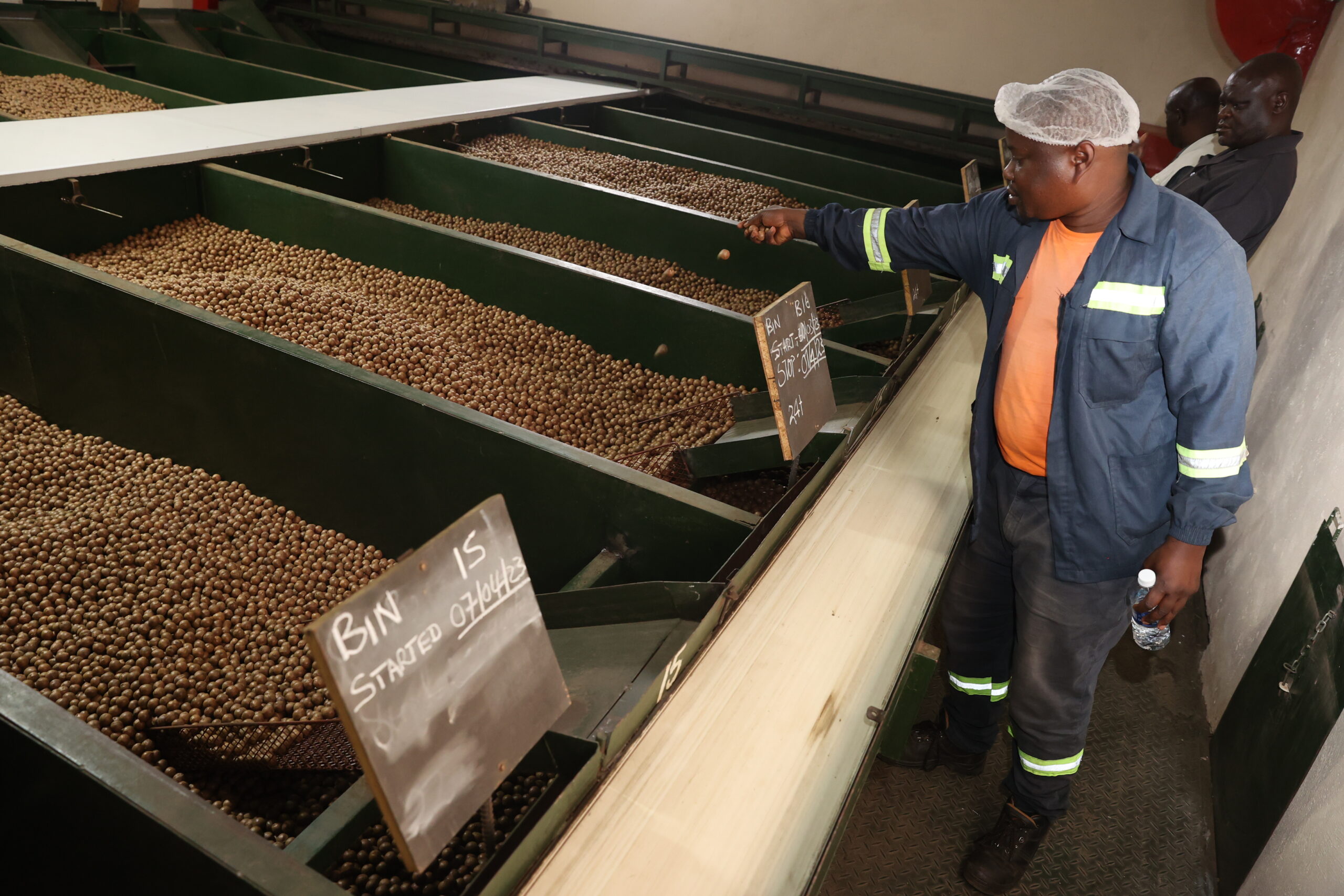
Chimanimani, Vumba and Chipinge to supply them with the nuts
“Between 1993 and 1998, the country was value adding its macadamia nuts producing oil, butter and residues for marketing. However, there has been a change now with Zimbabwe currently exporting nuts in shell with no value addition at all. This is an issue of concern, which shows that the industry has taken steps backwards,” observed the researchers.
Where do we go from here?
As a way forward, the researchers make the following recommendations:
“The government needs to come up with clear policies that support macadamia nuts given their high margins and the ever-increasing demand. The policies should ensure support for farmers in all aspects. Knowing the benefits derived from macadamia nuts, the government is supposed to take a leading role in ensuring that the farmers get seedlings, fertiliser and chemicals at affordable prices. This allows more and more farmers to own macadamia nuts orchards thereby reducing black marketing in the macadamia industry.
“Given that the growing of tobacco, which is the country’s highest foreign currency earner, is under threat from the Framework Convention of Tobacco Control which was effected in February 2015, macadamia nuts is the alternative to tobacco in terms of foreign currency generation especially if the industry is backed by research and government assistance. It is now high time for the country to establish a macadamia research institution.
“A research institution in macadamia nuts is key if the country needs to improve quality and the quality of nuts produced. The research institution will go a long way in making sure that farmers get good varieties that are suitable for our climatic conditions. Extension services are one critical element that is important in the macadamia nuts business. This is because most farmers in the macadamia nuts are newly resettled farmers who still need guidance to reduce high rejection rates. Training of extension workers and farmers is, therefore, very crucial to maintain quality and increase yields.
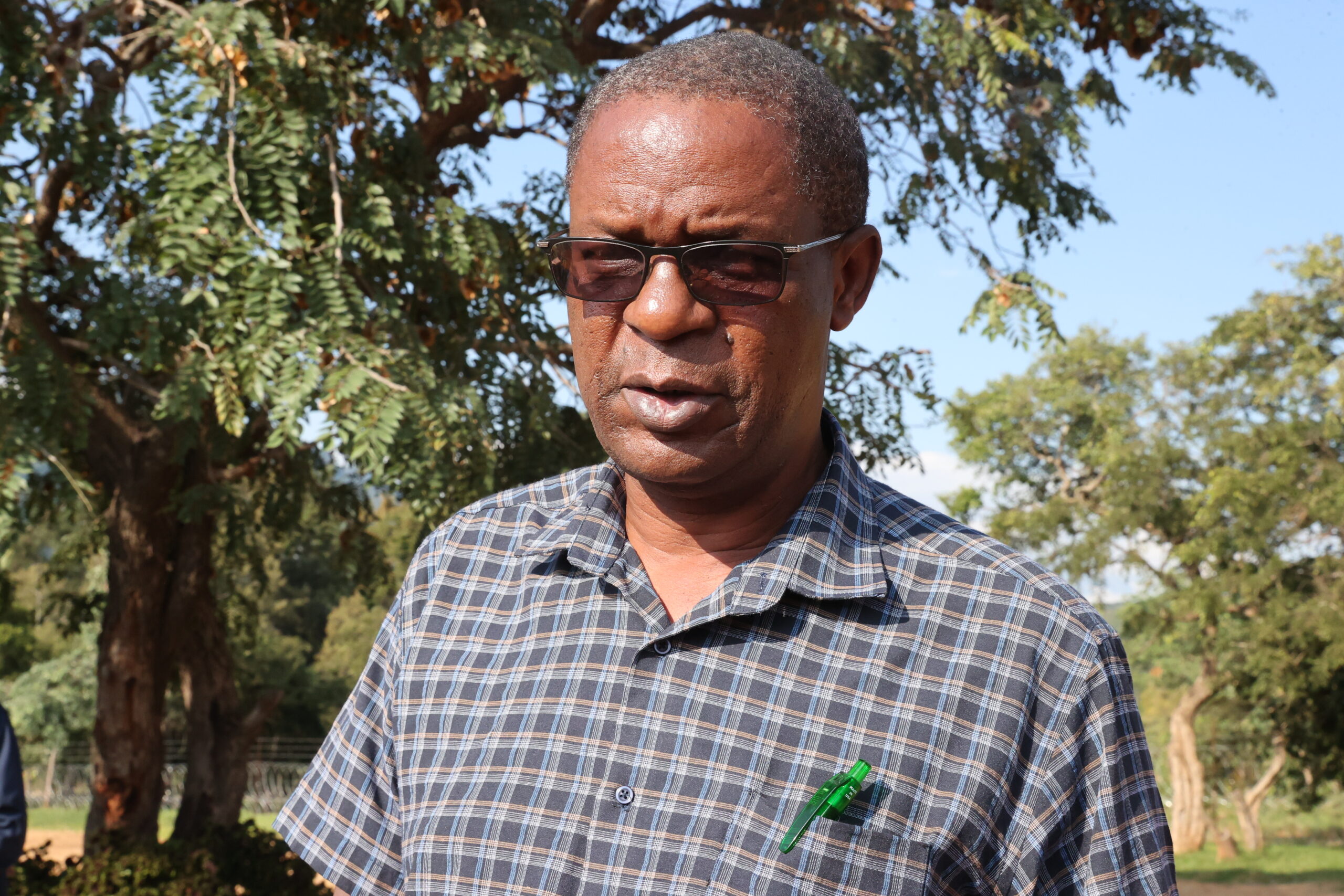
Chingono, whos company has also diversified into macadamia production
“Considering the difference in prices between in-shell nuts and cracked nuts, the government was supposed to be concerned and work towards promoting the macadamia nuts value chain through coming up with policies that promote the building of local macadamia nuts industries. Some countries have banned the export of nut in shell. Thus, the government should also enact policies that ensure value addition. Value addition allows the country to develop industries through foreign direct investment thereby creating employment for the locals. Both the farmers and the country are poised to get more through the export of value-added macadamia nuts.
“Considering the rampant theft in the macadamia industry in Zimbabwe, it is vital that the government introduce regulations that counter the scourge. The current regulation limits the theft punishment not to exceed Level 4 or imprisonment not exceeding 3 months. This regulation does not consider the value of stolen nuts and hence there is a mismatch. Theft leads to harvesting of immature nuts, which fetch less on the market.”




